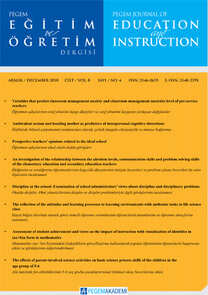The Models of Early Childhood Parenting In Families Whose Mothers are Factory Workers in Indonesia
The Models of Early Childhood Parenting In Families Whose Mothers are Factory Workers in Indonesia
___
- Barlow A, Duncan S. (2000). Family law, moral rationalities and New Labour’s communitarianism. Journal of Social Welfare and Family Law Part 1 22(1), pp: 23–42.
- Baumrind, D. (1966). Effects of authoritative parental control on child behavior. Child. Dev. 37, pp.887 – 907. http://dx.doi. org/10.2307/1126611.
- Baumrind, D. (1971). Current patterns of parental authority. Dev. Psychol. Monogr. 4, pp. 101 – 103.
- Baumrind, D. (1991). The influence of parenting style on adolescent competence and substance use. Journal of Early Adolescence, 11 (1), 56-95. http://dx.doi.org/10.1177/0272431691111004.
- Baumrind, D. (2005). Patterns of parental authority and adolescent autonomy. New Dir. Child Adolesc. Dev. (Wiley Periodicals, Inc.) 108, pp. 61 – 69. http://dx.doi.org/10.1002/cd.128.
- Belsky, J., Rha, J.H., Park, S. Y. (2000). Exploring reciprocal parent and child effects in US and Korea samples. Int. J. Behav. Dev. 24, pp. 338 – 347.
- Bornstein, L., Bornstein, M., H. (2014). Parenting Styles and Child Social Development. Encycloopedia on Early Childhood Development, pp. 1 – 3.
- Buri, J.R., Louiselle, P.A., Misukanis, T.M., Mueller, R.A. (1988) Effects of parental authoritarianism and authoritativeness on self-esteem. Personal. Soc. Psychol. Bull. 14 (2), pp. 271-282. http://dx.doi.org/10.1177/0146167288142006.
- Calafat, Amador, García, Fernando, Juan, Montse, Becoña, Elisardo, HErmida, José Ramón Fernández (2014). Which parenting style is more protective against adolescemt substamce use? Evidence within the European context. Drug Alcohol Depend. 14, S0376- S8716. http://dx.doi.org/10.1016/j.drugalcdep.2014.02.705, 00776-5.
- Darling, N..and Steinberg, L. (1993). Parenting style as context: an integrative model. Psychological Bulletin, 113(3), pp. 487 – 496.
- Duncan, S., Edwards, R., Reynolds, T. (2003). Mothers and child care: policies, values and theories. Children & Society. Published online in Wiley InterScience. DOI 10.1002/CHI.800.
- Dwairy, M., Fayad, M., Benyaqoub, N. (2013). Parenting profiles versus parenting factors and adolescents’ psychological disorders. Journal Education Development Psychology, 3 (2), ISSN 1927-10526 EISSN 1927-0534.
- Evers, J., C., van Staa, A. (2010). Qualitative analysis in case study. In Encyclopeedia of Case Study Research, edited by: A.J. Mills, G. Durepos & E. Wiebe. SGE Publications Inc. http://dx.doi. org/10.4135/9781412957397.
- Flick, Uwe (2013). The SAGE handbook of qualitative data analysis. SAGE Publications Inc.
- Fletcher, R., Freeman, E., & Matthey, S. (2011). The impact of behavioural parent training on fathers’ parenting: A metaanalysis of the Triple P-Positive Parenting Program. Fathering: A Journal of Theory, Research, and Practice about Men as Fathers, 9(3), pp: 291–312.
- Geertz, Clifford. (1983). Abangan, Santri dan Priyayi dalam Masyarakat Jawa. Jakarta: Pustaka Jaya.
- Gover J. (2002). The balance model: theorising women’s employment behaviour. In Analysing Families: Morality and Rationality in Policy and Practice, Carling A, Duncan S, Edwards R (eds). Routledge: London; 251–267.
- Kaufman, G.. (2013). Superdads: How fathers balance work and family in the 21st century. New York: New York Univeristy Press.
- Keenan, Thomas., and Evans, Subhadra. (2009). An Introduction to Child Development. London: Sage Foundations of Psychology. Konrad, S. Č. (2016). Family emotional expressiveness and family structure. PSIHOLOGIJA, Vol. 49(4), 319–333
- Kuppens, S., Ceulemans, E. (2018). Parenting Styles: A Closer Look at a Well-Known Concept. Journal of Child and Family Studies 28, pp: 168–181. https://doi.org/10.1007/s10826-018-1242-x
- Maccoby, E., E. (2000). Parenting and its effects on Children: on reading and misreading behavior genetics. Annu. Rev. Psychol, 51, pp. 1 – 27.
- Miles, Matthew B., Huberman, A. Michael. (1992). Analisis Data Kualitatif Buku Sumber Tentang Metode –Metode Baru, translator T. R. Rohidi. Jakarta: UI-Press.
- Morisson, George S. (2012). Dasar-Dasar Pendidikan Anak Usia Dini.Edisi Kelima, Terjemahan Suci Romadhona dan Apri Widiastuti. Jakarta: Indeks.
- Lin, K. Y., Burgard, S. A. (2018). Working, parenting and work-home spoillover: Gender differens in the work-home interface across the life course. Advances in Life Course Research, 35, pp: 24 – 36.
- Piotrowska, P.J., Tully, L.A., Lenroot, R. et al. (2017). Mothers, Fathers, and Parental Systems: A Conceptual Model of Parental Engagement in Programmes for Child Mental Health—Connect, Attend, Participate, Enact (CAPE). Clin Child Fam Psychol Rev, 20, 146-161. https://doi.org/10.1007/s10567-016-0219-9
- Samman, E., Presler-Marshall, E., Jones, N., Bhatkal, T., Melamed, C., Stavropoulou, M., Wallace, J. (2016). Women’s work: Mothers, children and the global childcare crisis. London: Overseas Development Institute.
- Santrock, John W. (2007). Perkembangan Anak. Terjemahan Mila Rachmawati dan Anna Kuswanti. Jakarta: Erlangga.
- Sayer, L. C. (2005). Gender, time, and inequality: Trends in women’s and men’s paid work, unpaid work, and free time. Social Forces, 84 (1), pp: 285 – 303.
- Sugiyono. (2009). Metode Penelitian Pendidikan Pendekatan Kuantitatif, Kualitatif, dan R&D. Bandung: Alfabeta.
- Warren, E., & Tyagi, A. W. (2004). The two income trap: Why middle- class parents are going broke. Basic Books.
- Wheelock J, Jones K. 2002. Grandparents are the next best thing’: informal child care for working parents in urban Britain. Journal of Social Policy 31(3), pp. 441–464.
- ISSN: 2146-0655
- Başlangıç: 2011
- Yayıncı: Pegem Akademi Yayıncılık Eğitim Danışmanlık Hizmetleri Tic. Ltd. Şti.
Characterizing Indonesian EFL Teachers’ Questioning as Informal Formative Assessment Strategy
Nunung Suryati, Milawati, Ali Saukah, Suharmanto
Evaluation of a Developed Financial Literacy Program in High School Students
Burku ÖZDEMİR, Gülden KAYA UYANIK
Beck Depression Inventory-II: A Study for Meta Analytical Reliability Generalization
Representing teaching staff in Jordanian Universities for the 21st Century skills
Abdullah Khataybeh, Khawla Aljarrah
A Comparative Study on the Education Systems in the Turkic Countries
Burcu AKKAYA, İsmet ERGİN, Sibel AÇIŞLI ÇELİK
Autonomous Learning Activities: The Perceptions of English Language Students in Indonesia
Utami Widiati, Nunung Suryati, Khulaifiyah, Mirjam Anugerahwati
Zeynep BAŞCI NAMLI, Fatih KAYAALP, Elif MERAL
The Models of Early Childhood Parenting In Families Whose Mothers are Factory Workers in Indonesia
Fatwa Aji Kurniawan, Fauzi, Moh. Roqib, Abdul Wachid Bambang Suharto, Heru Kurniawan, Ifada Novikasari
Students Creativity Development Model and Its Implementation in Indonesian Islamic Elementary School
